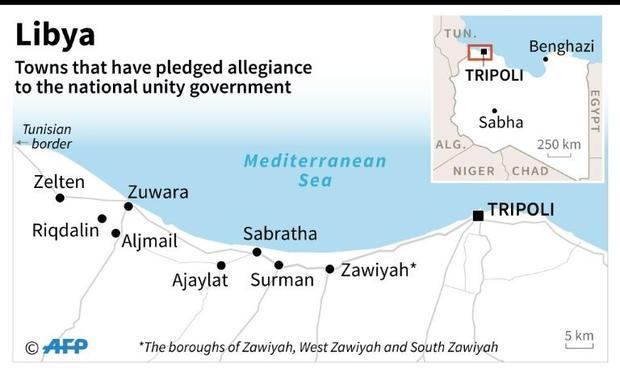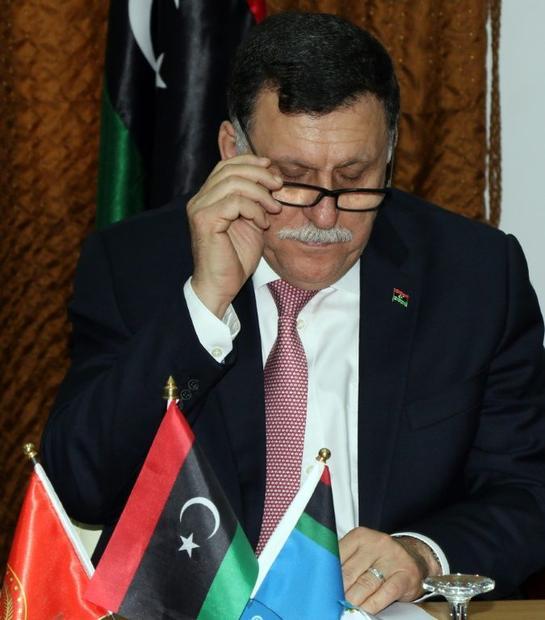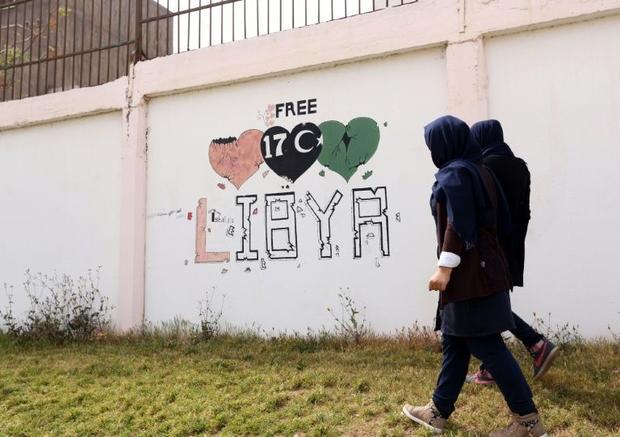Libya's UN-backed unity government won the support Friday of guards who secure the country's key oil terminals, the latest pledge of loyalty for a cabinet facing strong opposition from rival political forces.
Libya's warring sides are under intense international pressure to cede power to prime minister-designate Fayez al-Sarraj, whose arrival in the capital on Wednesday angered a rival Tripoli-based government.
Sarraj, a businessman from Tripoli who was a member of a committee that paved the way to national dialogue, appeared Friday in public for the first time since his arrival, joining weekly prayers at a mosque in the city centre.
There are signs that allegiances are starting to shift in his favour, as a unit of guards in charge of securing installations in Libya's so-called "oil crescent" in the east of the country pledged its loyalty.
"All the oil terminals under our jurisdiction have been placed under the authority of the unity government," a guards official told AFP.
He said that revenues from oil exported from those terminals, including the main one at Ras Lanuf, would be allowed only if they are "for the benefit" of the Government of National Accord (GNA).
Libya has been awash with weapons since the 2011 uprising that ousted and killed longtime dictator Moamer Kadhafi, with a slew of militias battling for control of its cities and oil wealth.
It has had two rival governments since mid-2014, when the Libya Dawn militia alliance overran Tripoli, forcing the internationally recognised government to flee to the east.
Oil is Libya's main natural resource, with reserves estimated at 48 billion barrels, the largest in Africa. It had a pre-revolt output capacity of about 1.6 million barrels per day, but unrest has forced a major slump in production.
Control of the oil industry is essential for the new government, which not only needs to unite the divided country but also shore up its economy.
On Thursday, 10 western cities also rallied around Sarraj's government and urged Libyans to back it, in a major blow to the unrecognised Tripoli authorities who are refusing to cede power.
The announcement came in a statement on the official Facebook page of the Sabratha municipality near the border with Tunisia.
"The situation of the country is sad. Life is very expensive, there is no cash, and so we saw that it's time to support this government in order to start solving all of these issues," said Sabratha mayor Hussein al-Dawadi.
- 'Act of courage' -
The Tripoli administration demanded that Sarraj leave or surrender following his arrival by sea Wednesday, after airspace was closed to prevent him flying into the capital.
Sarraj and a number of his ministers joined the weekly Muslim prayer under heavy security, and worshippers gathered around him to snap pictures which they posted on Twitter.
On Thursday he met the head of Libya's Tripoli-based central bank and discussed measures to safeguard banks and tackle the country's "cash flow problem,", Sarraj's office said.
Perhaps crucially, the unity government also now has the support of the main armed group in the city, Nawasi, signalling a split within the security forces once loyal to the Tripoli authorities.
"This is the bandwagon effect that many were hoping for," said Mattia Toaldo, a policy fellow at the European Council on Foreign Relations.
The unity leaders and their backers "have managed to convince a great part of what used to be Libya Dawn to join the GNA," he said.
A European diplomatic source said that Sarraj decided himself to travel by boat to Libya this week after growing frustrated with the lack of progress on peace efforts.
"It's either a headlong rush or an act of courage that changes everything," the source told AFP.
- 'Chaos aids terrorism' -
World powers are increasingly alarmed about the rise of the Islamic State jihadist group in Libya, located just 300 kilometres (185 miles) away from Europe.
IS has established a stronghold in Kadhafi's coastal hometown of Sirte and launched a wave of attacks, both against rival Libyan forces and across the border in Tunisia.
The country has also long been a stepping stone for migrants seeking to cross the Mediterranean, and in recent years traffickers have exploited the country's instability.
French Foreign Minister Jean-Marc Ayrault on Friday urged the international community to prepare to help the unity government if asked, providing military support if necessary.
"The chaos which reigns there today aids the rapid development of terrorism. It is a direct threat to the region and to Europe," he said in comments to a French newspaper.
The European Union agreed Thursday to impose sanctions on three Libyans for obstructing the formation of Sarraj's government.
Libya’s UN-backed unity government won the support Friday of guards who secure the country’s key oil terminals, the latest pledge of loyalty for a cabinet facing strong opposition from rival political forces.
Libya’s warring sides are under intense international pressure to cede power to prime minister-designate Fayez al-Sarraj, whose arrival in the capital on Wednesday angered a rival Tripoli-based government.
Sarraj, a businessman from Tripoli who was a member of a committee that paved the way to national dialogue, appeared Friday in public for the first time since his arrival, joining weekly prayers at a mosque in the city centre.
There are signs that allegiances are starting to shift in his favour, as a unit of guards in charge of securing installations in Libya’s so-called “oil crescent” in the east of the country pledged its loyalty.
“All the oil terminals under our jurisdiction have been placed under the authority of the unity government,” a guards official told AFP.
He said that revenues from oil exported from those terminals, including the main one at Ras Lanuf, would be allowed only if they are “for the benefit” of the Government of National Accord (GNA).
Libya has been awash with weapons since the 2011 uprising that ousted and killed longtime dictator Moamer Kadhafi, with a slew of militias battling for control of its cities and oil wealth.
It has had two rival governments since mid-2014, when the Libya Dawn militia alliance overran Tripoli, forcing the internationally recognised government to flee to the east.
Oil is Libya’s main natural resource, with reserves estimated at 48 billion barrels, the largest in Africa. It had a pre-revolt output capacity of about 1.6 million barrels per day, but unrest has forced a major slump in production.
Control of the oil industry is essential for the new government, which not only needs to unite the divided country but also shore up its economy.
On Thursday, 10 western cities also rallied around Sarraj’s government and urged Libyans to back it, in a major blow to the unrecognised Tripoli authorities who are refusing to cede power.
The announcement came in a statement on the official Facebook page of the Sabratha municipality near the border with Tunisia.
“The situation of the country is sad. Life is very expensive, there is no cash, and so we saw that it’s time to support this government in order to start solving all of these issues,” said Sabratha mayor Hussein al-Dawadi.
– ‘Act of courage’ –
The Tripoli administration demanded that Sarraj leave or surrender following his arrival by sea Wednesday, after airspace was closed to prevent him flying into the capital.
Sarraj and a number of his ministers joined the weekly Muslim prayer under heavy security, and worshippers gathered around him to snap pictures which they posted on Twitter.
On Thursday he met the head of Libya’s Tripoli-based central bank and discussed measures to safeguard banks and tackle the country’s “cash flow problem,”, Sarraj’s office said.
Perhaps crucially, the unity government also now has the support of the main armed group in the city, Nawasi, signalling a split within the security forces once loyal to the Tripoli authorities.
“This is the bandwagon effect that many were hoping for,” said Mattia Toaldo, a policy fellow at the European Council on Foreign Relations.
The unity leaders and their backers “have managed to convince a great part of what used to be Libya Dawn to join the GNA,” he said.
A European diplomatic source said that Sarraj decided himself to travel by boat to Libya this week after growing frustrated with the lack of progress on peace efforts.
“It’s either a headlong rush or an act of courage that changes everything,” the source told AFP.
– ‘Chaos aids terrorism’ –
World powers are increasingly alarmed about the rise of the Islamic State jihadist group in Libya, located just 300 kilometres (185 miles) away from Europe.
IS has established a stronghold in Kadhafi’s coastal hometown of Sirte and launched a wave of attacks, both against rival Libyan forces and across the border in Tunisia.
The country has also long been a stepping stone for migrants seeking to cross the Mediterranean, and in recent years traffickers have exploited the country’s instability.
French Foreign Minister Jean-Marc Ayrault on Friday urged the international community to prepare to help the unity government if asked, providing military support if necessary.
“The chaos which reigns there today aids the rapid development of terrorism. It is a direct threat to the region and to Europe,” he said in comments to a French newspaper.
The European Union agreed Thursday to impose sanctions on three Libyans for obstructing the formation of Sarraj’s government.
















